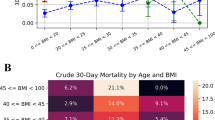Abstract
Background
Patients with ulcerative colitis (UC) are at an increased risk of Clostridium difficile infection (CDI) compared with the general population. Recent data suggest that obesity also increases the risk of CDI.
Aims
To examine whether obesity influences the risk of CDI among patients with UC.
Study
We conducted a retrospective cross-sectional study of UC patients seen in gastroenterology clinic between January 1, 2014, and December 31, 2015. Records were reviewed for patients with the diagnosis of UC prior to 2014, and the first diagnosis of CDI between January 1, 2014, and December 31, 2015. Using body mass index (BMI), patients were classified into underweight (BMI < 18.5), normal weight (18.5 ≤ BMI < 25), overweight (25 ≤ BMI < 30), and obese (BMI ≥ 30). Age-adjusted and multivariate logistic regression was performed including gender, tobacco use, UC disease duration, medication exposure, and vitamin D deficiency.
Results
Of the 636 patients with UC, 114 (18%) were obese, 232 (36%) overweight, 274 (43%) normal weight, and 16 (2.5%) underweight. Nineteen patients (3.0%) developed CDI during the study period. CDI risk was not associated with BMI (OR 0.90, 95% CI 0.79–1.02). Compared to normal weight patients, risk of CDI was not influenced by being obese (multivariate OR 0.63, 95% CI 0.15–2.58), overweight (multivariate OR 0.33, 95% CI 0.08–1.30), or underweight (multivariate OR 2.98, 95% CI 0.45–19.83). CDI was associated with ever use of TNF therapy (multivariate OR 6.09, 95% CI 2.07–17.93) but not vedolizumab (multivariate OR 0.76, 95% CI 0.08–7.36).
Conclusions
Obesity does not appear to be associated with the risk of C. difficile infection among patients with UC.
Similar content being viewed by others
References
Surawicz CM, Brandt LJ, Binion DG, et al. Guidelines for diagnosis, treatment, and prevention of Clostridium difficile infections. Am J Gastroenterol. 2013;108:478–498. quiz 99.
Bloomfield LE, Riley TV. Epidemiology and risk factors for community-associated Clostridium difficile infection: a narrative review. Infect Dis Ther. 2016;5:231–251.
Issa M, Vijayapal A, Graham MB, et al. Impact of Clostridium difficile on inflammatory bowel disease. Clin Gastroenterol Hepatol. 2007;5:345–351.
Bishara J, Farah R, Mograbi J, et al. Obesity as a risk factor for Clostridium difficile infection. Clin Infect Dis. 2013;57:489–493.
Mulki R, Baumann AJ, Alnabelsi T, et al. Body mass index greater than 35 is associated with severe Clostridium difficile infection. Aliment Pharmacol Ther. 2017;45:75–81.
Punni E, Pula JL, Asslo F, Baddoura W, DeBari VA. Is obesity a risk factor for Clostridium difficile infection? Obes Res Clin Pract. 2015;9:50–54.
Sousa Guerreiro C, Cravo M, Costa AR, et al. A comprehensive approach to evaluate nutritional status in Crohn’s patients in the era of biologic therapy: a case-control study. Am J Gastroenterol. 2007;102:2551–2556.
Haas L, Chevalier R, Major BT, Enders F, Kumar S, Tung J. Biologic agents are associated with excessive weight gain in children with inflammatory bowel disease. Dig Dis Sci. 2017;62:3110–3116. https://doi.org/10.1007/s10620-017-4745-1.
Scaldaferri F, D’Ambrosio D, Holleran G, et al. Body mass index influences infliximab post-infusion levels and correlates with prospective loss of response to the drug in a cohort of inflammatory bowel disease patients under maintenance therapy with infliximab. PLoS ONE. 2017;12:e0186575.
Guerbau L, Gerard R, Duveau N, et al. Patients with crohn’s disease with high body mass index present more frequent and rapid loss of response to infliximab. Inflamm Bowel Dis. 2017;23:1853–1859.
Kistangari G, Lopez R, Shen B. Frequency and risk factors of Clostridium difficile infection in hospitalized patients with pouchitis: a population-based study. Inflamm Bowel Dis. 2017;23:661–671.
Manichanh C, Borruel N, Casellas F, Guarner F. The gut microbiota in IBD. Nat Rev Gastroenterol Hepatol. 2012;9:599–608.
Manges AR, Labbe A, Loo VG, et al. Comparative metagenomic study of alterations to the intestinal microbiota and risk of nosocomial Clostridum difficile-associated disease. J Infect Dis. 2010;202:1877–1884.
Hopkins MJ, Macfarlane GT. Changes in predominant bacterial populations in human faeces with age and with Clostridium difficile infection. J Med Microbiol. 2002;51:448–454.
Kornbluth A, Sachar DB, Practice Parameters Committee of the American College of G. Ulcerative colitis practice guidelines in adults: American college of gastroenterology, practice parameters committee. Am J Gastroenterol. 2010;105:501–523. quiz 24.
Khanna S, Shin A, Kelly CP. Management of Clostridium difficile infection in inflammatory bowel disease: expert review from the clinical practice updates committee of the AGA institute. Clin Gastroenterol Hepatol. 2017;15:166–174.
Schneeweiss S, Korzenik J, Solomon DH, Canning C, Lee J, Bressler B. Infliximab and other immunomodulating drugs in patients with inflammatory bowel disease and the risk of serious bacterial infections. Aliment Pharmacol Ther. 2009;30:253–264.
Razik R, Rumman A, Bahreini Z, McGeer A, Nguyen GC. Recurrence of Clostridium difficile infection in patients with inflammatory bowel disease: the RECIDIVISM study. Am J Gastroenterol. 2016;111:1141–1146.
Vindigni SM, Broussard EK, Surawicz CM. Alteration of the intestinal microbiome: fecal microbiota transplant and probiotics for Clostridium difficile and beyond. Expert Rev Gastroenterol Hepatol. 2013;7:615–628.
Acknowledgments
Research reported in this publication was supported by the Scripps Clinic Medical Group Research & Education Award (G.G.K.).
Author information
Authors and Affiliations
Contributions
GGK contributed to study concept and design, acquisition of data, analysis and interpretation of data, drafting of the manuscript, critical revision of the manuscript, and funding. SC contributed to study concept and design, acquisition of data, analysis and interpretation of data, and drafting of the manuscript. CW contributed to acquisition of data, analysis and interpretation of data, and critical revision of the manuscript. HK, AA, JW, and WR contributed to analysis and interpretation of data and critical revision of the manuscript.
Corresponding author
Ethics declarations
Conflict of interest
Gauree Gupta Konijeti: Previously received honoraria from Abbvie, Janssen, Pfizer, and Takeda. The other authors report no relevant conflict of interest.
Rights and permissions
About this article
Cite this article
Chandradas, S., Khalili, H., Ananthakrishnan, A. et al. Does Obesity Influence the Risk of Clostridium difficile Infection Among Patients with Ulcerative Colitis?. Dig Dis Sci 63, 2445–2450 (2018). https://doi.org/10.1007/s10620-018-5108-2
Received:
Accepted:
Published:
Issue Date:
DOI: https://doi.org/10.1007/s10620-018-5108-2




